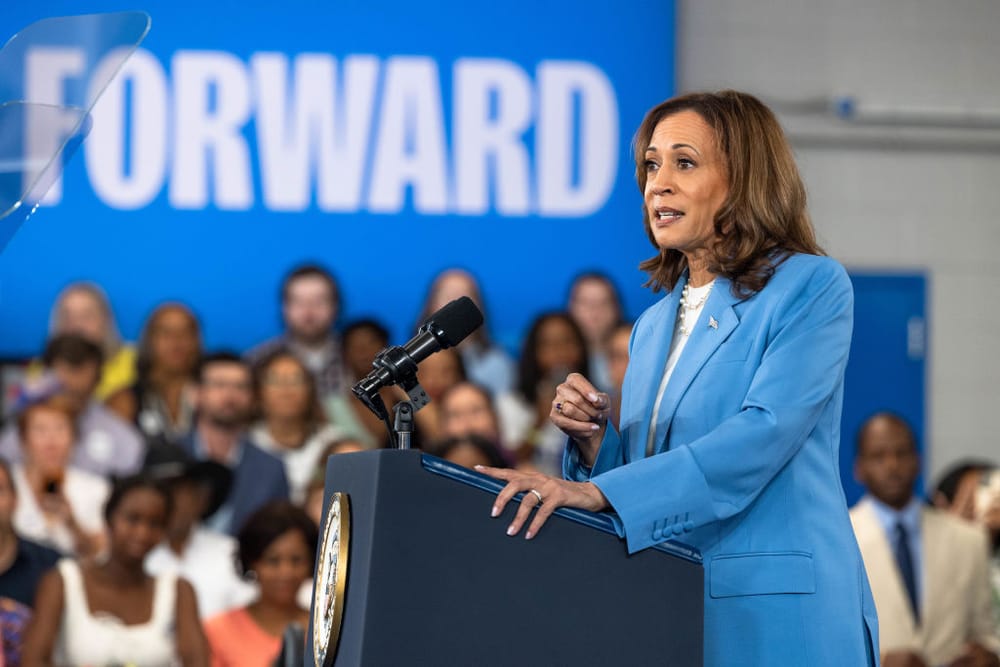In the south, we have a saying: you catch more flies with honey than spoiled milk. It's a modified version of the Italian proverb, "you catch more flies with honey than vinegar." It means that people will more likely gravitate to you when you're kind rather than cruel or sweet rather than bitter. In political discourse, for instance, some are choosing to mispronounce Kamala Harris's name, opting for sour milk rather than sweet honey. Those exhibiting this behavior have nothing to gain and much to lose. Let's unpack this.
Mispronouncing someone's name when you know how to say it correctly is a microaggression, an effort to disparage them. In a society that places whiteness on a pedestal, the correct pronunciation of racial minorities' names has become a casualty of cultural warfare. While saying someone's name correctly indicates respect or civility, some believe they have no obligation to extend the olive branch or engage in constructive discourse. Name discrimination is insidious because it lends someone plausible deniability, as the speaker often denies they meant any harm, portraying their behavior as an honest mistake. This, in turn, pressures the offended party to accept their apology, even if it's not genuine.
In an NPR article, Deepa Shivaram explained that the proper way to pronounce Kamala's name is Kahm-uh-lu, like "comma," not CAM-el-uh, "like camel," or Ka-MAL-uh like "koala," arguing that it's important to learn how to say her name correctly. However, not everyone is willing to apply the lesson, as Donald Trump demonstrated on the campaign trail last July. He told the crowd, "They are explaining to me, 'You can't say ka-MALA — you can say COMMA-la," but "Don't worry about it — I couldn't care less if I mispronounce it. I couldn't care less." His disrespectful tone seemed to resonate with others in his party. For instance, Rep. Nancy Mace, R-S.C, told a panel on CNN, "I will say Kamala's name any way that I want to," defiantly rejecting efforts to teach her the correct pronunciation. Michael Eric Dyson characterized her response as reflective of "the history and legacy of disregard for the humanity of Black people." Instead of considering his perspective, Nancy asked whether Michael was calling her racist.
Dyson wasn't calling Nancy Mace a racist. As he pointed out, someone's behavior can have a racist impact even if the individual doesn't have any malicious intent. Despite him giving her the benefit of the doubt, she deflected. While white people often focus on their intentions, which are subjective, Dyson's response focused on the consequences of her behavior — perpetuating racism against this country's first Black Vice President. Far too often, racism presents itself as a rejection of civility. As I wrote in Momentum, "Part of treating Black people as less than human involved stripping them of some of the essential elements of identity." Like Trump, Nancy seemed unwilling to change her behavior or even consider the merits of those advocating for correct pronunciation. As Dyson suggested, this disrespect is rooted in the racist tradition of othering Black people in subtle but meaningful ways.
Refusing to pronounce someone's name correctly is different than not knowing how. Introducing a new skill often requires patience, and teachers should extend grace. That is why some videos teaching people how to pronounce Kamala's name correctly have garnered substantial attention since she launched her presidential campaign. However, what happens when someone intentionally mispronounces a name? This is an effort to deny them the basic right of identity. When you meet someone new, their name is often the first information you learn about them. If communication is a garden with endless possibilities, someone's name is undoubtedly the key. Calling someone's name is your entryway — you ennunciate it when speaking to them. Or, in their absence, use it to talk about them or reference their words. Refusing to pronounce someone's name correctly is an act of rebellion, and we should consider what they're rebelling against. By my estimate, it's interracial civility, the notion that no matter what racial group or political party someone belongs to, they deserve respect.
Americans must read between the lines to understand subtle forms of prejudice, like name discrimination. When people double down by saying "Kamala" incorrectly, they're hoping others focus on her name as foreign compared to English-derived names, despite her being born in California. Their refusal to bridge the gap and pronounce her name correctly has become a metaphorical border wall — a way of keeping racial and ethnic minorities out by refusing to treat them with the civility extended to ingroup members. Doubling down on saying Kamala's name wrong is a classic example of how microaggressions function. Rather than dealing one fatal blow, they act as little cuts, chipping away at someone's dignity.
It costs nothing to pronounce someone's name correctly, but by perpetuating racism, there's much to lose. You catch more flies with honey than sour milk. Racism, in this case, is a lot like spoiled milk because it's disgusting, rooted in outdated thinking, and a risk to anyone who consumes it.
This post originally appeared on Medium and is edited and republished with author's permission. Read more of Allison Gaines' work on Medium.
